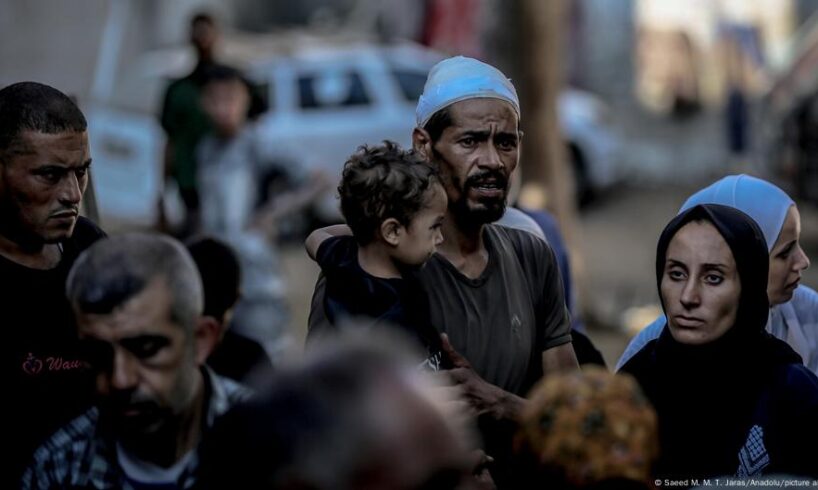
German Chancellery Minister Thorsten Frei on Wednesday dismissed concerns of a rift within Germany’s coalition government over its position on Israel.
An apparent split emerged after Germany opted not to join dozens of Western countries in signing a condemnation of the “inhumane killing” of Palestinian civilians in Gaza.
What has Berlin said about the Gaza letter?
Frei, Chancellor Friedrich Merz’s top aide, said the coalition was united in its aims regarding Gaza, even if there were divisions over how Germany could achieve them.
“There’s not even a sheet of paper between the partners,” Frei told German broadcaster ZDF. “Of course, you can have different views about the form and the path to a shared goal.”
On Tuesday, leading figures in the center-left Social Democrats (SPD), the junior coalition partner to Merz’s Christian Democrats (CDU), urged the government to join a joint declaration signed by 28 states, including France, Italy and the UK, as well as the European Commission, the European Union’s executive branch.
It called for an immediate end to the war in Gaza and condemned Israel’s actions. Germany has so far declined to sign on to the declaration.
However, Frei defended the government’s stance, saying the declaration lacked clarity in its sequencing of events. “It must be made clear that the starting point of this war was Hamas’s attack on October 7, 2023, and that Hamas continues to hold hostages,” he said. He added that Germany maintains “many channels of contact” with the Israeli government.
Gaza’s hunger crisis worsens amid ongoing Israeli offensive
To view this video please enable JavaScript, and consider upgrading to a web browser that supports HTML5 video
Frei emphasized that “the humanitarian situation in Gaza must change,” and while Israel has the right to self-defense, protecting civilians is “a legal imperative under international law.”
What did the SPD say about the declaration?
Matthias Miersch, the SPD’s parliamentary leader, praised the signatory states, including Germany’s “closest partners such as France, Canada and Austria,” for sending “a clear signal.”
The countries involved condemned what they called the “drip feeding of aid” to Palestinians in Gaza and said it was “horrifying” that more than 800 civilians had been killed while seeking food and water.
“If international law is systematically violated, there must be consequences,” Miersch wrote on the platform X. “Germany should join the UK’s initiative and not opt out here.”
“Starving children, destroyed infrastructure, attacks on people seeking help: That goes against everything that international humanitarian law protects,” the senior SPD politician said.
Reem Alabali-Radovan, Germany’s international development minister and an SPD member, said Tuesday she was disappointed by the decision.
“The demands in the letter from the 29 partners to the Israeli government are understandable to me. I would have wished for Germany to join the signal sent by the 29 partners,” she said.
‘Clean water running dangerously low’ in Gaza
To view this video please enable JavaScript, and consider upgrading to a web browser that supports HTML5 video
SPD foreign policy spokesperson Adis Ahmetovic and rapporteur for the Middle East Rolf Mützenich, both senior lawmakers within the party, also called on Germany to join the declaration. They stressed in a joint statement that “the situation in Gaza is catastrophic and represents a humanitarian abyss.”
How has Merz defined his position?
German officials have said their stance on Israel is shaped by a unique responsibility, the Staatsraison (reason of state), rooted in the country’s Nazi-era history and the Holocaust. They argued they can accomplish more through private diplomatic channels than with public declarations.
Merz has said the European Council, the heads of state or government of the European Union, had already issued a joint declaration “practically identical in content to what is expressed in the letter” now circulating.
He pointed to the Council’s June statement, which deplored the humanitarian crisis in Gaza but was less emotional and bluntly critical of Israel and did not condemn its planned relocation of Palestinians to a so-called “humanitarian city” unveiled earlier this month.
“I was one of the first to say very clearly, even in Germany, that the situation there is no longer acceptable,” Merz said, pushing back on claims of any split.
On Monday, he said he had spoken with Israeli Prime Minister Benjamin Netanyahu on Friday, telling him “very clearly and very explicitly that we do not share the Israeli government’s policy on Gaza.”
“The way the Israeli army is operating there is not acceptable,” Merz said.
Fractures within the ruling coalition, only in power since May, were already exposed over a dispute about the appointment of a Constitutional Court judge.
Edited by: Elizabeth Schumacher





